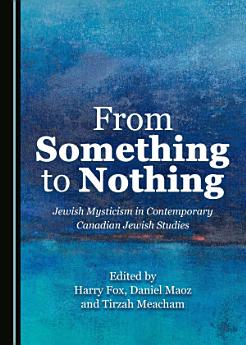From Something to Nothing: Jewish Mysticism in Contemporary Canadian Jewish Studies
About this ebook
Integral to the title, From Something to Nothing, is the concept that God cannot be something, because that would be restricting, so God is simply no-thing. Ironically, the conventional religious expression for the biblical notion of creation is “something from nothing”, whereas the title of this volume is its precise opposite, which may at first seem to be illogical – creation in reverse. However, in a volume dedicated to various deliberations on magic and mysticism, the ultimate reality may receive expression as nothingness, that is, no-thingness, no quality associated with things. What adds to our difficulty today is that nothingness is inextricably linked with silence. Is silence also an element or indication of an ultimate reality or its absence? Or is it merely the reflection of nothing whatsoever? This is at the heart of modern debates between atheists and believers. Believers feel that even this silence speaks to this ultimate reality, whereas atheists claim that if you cannot show it, then you do not know it. In other words, believers are victims of their own wishful thinking.
From Something to Nothing memorializes Canadian mystic and scholar Zalman Schachter Shalomi, z”l, engaging in particular aspects that he addressed at some phase of his colourful and erudite life, providing the reader with a broad spectrum of both phenomenological and intellectual topics.
About the author
Daniel Maoz is Professor of Hebrew Scriptures and Jewish Scholar-in-Residence at Martin Luther University College at Wilfrid Laurier University, Canada, and a Research Associate in the Religion Department at Concordia University, Canada. He is Vice-President of the Canadian Society for Jewish Studies.
Tirzah Meacham is Associate Professor in the Department of Near and Middle Eastern Civilizations at the University of Toronto, Canada. She co-edited Introducing Tosefta (with Harry Fox), published the annotated edition of Rav Shmuel ben Hofni Gaon’s book Sefer HaBagrut, and edited Sex Rewarded, Sex Punished: A Study of the Status ‘Female Slave’ in Early Jewish Law by Diane Kriger.





